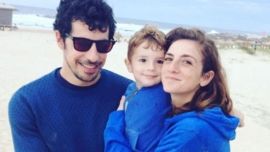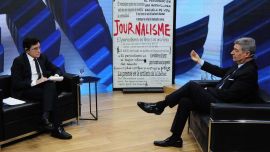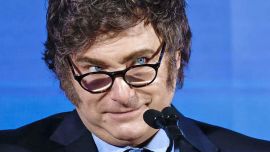Under President Mauricio Macri, Argentina has become a leader in the regional pushback against the government of Venezuelan President Nicolás Maduro.
Yet with Peronist presidential hopeful Alberto Fernández now likely to take the Casa Rosada in October’s election, the country seems set to break with years of foreign policy aimed at isolating and condemning Maduro’s government. Such a move could have serious repercussions for regional relationships and especially the Lima Group, which has sought Maduro’s removal and the installation of National Assembly chief Juan Guaidó in his stead.
In his first major statement on foreign affairs, Fernández said this week that his government would seek to create a dialogue with Venezuela, rather than call for Maduro’s immediate ouster.
“I believe that the problem in Venezuela is not going to be resolved with marines, it won’t be resolved supporting an invasion,” Fernández said in an interview with Canal 13 on Tuesday. “The problem in Venezuela will be resolved by favouring the betterment of institutional quality and democratic coexistence in Venezuela.”
In his remarks, the Frente de Todos candidate held up the stances of Mexico and Uruguay, which he said support dialogue with the Venezuelan government to solve Latin America’s foremost humanitarian and economic crisis.
“It’s interesting that he talked about Mexico and Uruguay’s positions, because they’re different,” said Geoff Ramsey, the assistant director for Venezuela at the Washington Office on Latin America, a think-tank and advocacy group based in the United States.
The policy of Mexican President Andrés Manuel López Obrador, Ramsey explained, consists of calls for non-intervention in Venezuela affairs and direct dialogue with Maduro’s government without preconditions.
Yet the government of Uruguayan President Tabaré Vásquez is aligned with the International Contact Group, a coalition of eight European countries and three other Latin American nations. The coalition calls for a negotiated settlement to Venezuela’s crisis, and ultimately open elections to decide the country’s next leader.
“I think Argentina could play a more effective role in promoting a more democratic solution if they join with the international contact group, instead of these hollow calls to dialogue that we’ve seen from AMLO,” Ramsey said.
WINDS OF CHANGE
Furthermore, Uruguay faces a change of government in the coming months too.
At present, the centre-right opposition appears set to win the country’s elections in October – Luis Lacalle Pou, the National Party’s candidate, has campaigned explicitly against the government’s policy towards Venezuela and has called Maduro’s government “a dictatorship.”
Victory by Uruguay’s opposition in October would further isolate Fernández’s position of dialogue with Venezuela throughout the region, according to experts.
“My fear would be we end up having less regional pressure, when we really need that to ensure that when conditions are right, negotiations will actually move forward,” said Andrei Serbin Pont, an international analyst and director of the Regional Coordinator of Economic and Social Investigations.
“The message that it’s sending out is that Maduro will be alleviated in the regional pressure that’s on him,” Serbin Pont told the Times, referring to Fernández’s stance.
Regardless of the Peronist presidential candidate’s policy should he take office in December, Macri’s exit from power will mark a departure of one of Maduro’s fiercest critics.
When Macri took office in 2015, left-wing governments traditionally aligned with Maduro’s predecessor Hugo Chávez dominated the region.
During his first electoral campaign, Macri – who has historic ties to Venezuela’s opposition – put criticism of Maduro’s government at the forefront of his successful candidacy.
At his election night bunker in 2015, Macri had at his side Lilian Tintori, the wife of previously jailed Venezuelan opposition leader Leopoldo López, a gesture to show his government would represent a major break with more than 15 years of left-wing, populist leaders in the region.
“The first one to start taking these strong steps was Macri,” Serbin Pont said. “That helped start creating the spaces for these harder positions on Venezuela.”
But while Macri retained his hard-line position toward Venezuela, he was eventually eclipsed by more aggressive members of the Lima Group like Colombia and Canada, according to WOLA’s Ramsey.
“He hasn’t adopted the same kind of profile as [President Iván] Duque in Colombia,” Ramsey said. “He hasn’t really made it a signature in the way the Colombian government has.”
Ramsey also pointed to Macri’s role in coaxing Uruguay’s Vásquez to align with the position of the European-led International Contact Group.
“It was one of the first times Uruguay was shifting from empty dialogue with no preconditions towards a negotiated, electoral transition,” Ramsey added.
EVENTS ON THE GROUND
Despite Fernández’s intentions to shift Argentine foreign policy in Latin America, events on the ground in Venezuela might be outpacing his potential presidency.
This week, as the revelation of “secret” talks between the United States and Maduro’s government dominated headlines, a flurry of negotiations has been taking place between global powers with interests in Venezuela’s future, including next week’s visit by Canada’s foreign minister to Cuba, a close ally of Maduro’s.
“Everybody’s negotiating, and my feeling is the problem has grown to such a high level of tension and danger that something will come out,” said Emilio Figueredo, a political analyst and editor of Venezuelan news site Analítica.
“The big problem now is that Maduro has become an obstacle, an obstacle to a solution even for people around him,” Figueredo noted, pointing to top Maduro ally Diosdado Cabello.
Cabello, the president of the country’s Constituent Assembly, is rumoured to be in talks with the United States after Washington denied it was negotiating directly with Maduro, according to media reports.
Recent decisions by China’s top oil company and Turkey’s largest bank to cut ties with Venezuela, due to increased US sanctions, are further evidence of a looming political transition, according to Figueredo.
“I’ve never seen something moving at the speed that this thing is moving,” Figueredo said. “You have to go back to South Africa, and it took five years for apartheid [in South Africa] to fall. We’re talking about months, basically since January to now. A lot has happened.”























Comments